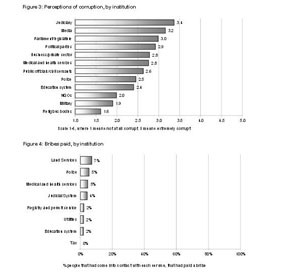Georgia appears at the bottom on the list of the most corrupted countries
By Ana Robakidze
Wednesday, July 10


More than one in two people however think corruption has worsened over the last two years, 27% of respondents said they had paid a bribe when accessing public services and institutions in the last year. More than half of those surveyed believe corruption has worsened in the last two years and in 51 countries around the world political parties are seen as the most corrupt institutions. The majority of the respondents say they would fight against corruption, nearly 9 out of 10 people surveyed said they would report a fact of corruption and 2/3 of those who were asked to pay a bribe say they had refused.
Georgia is among the countries with the lowest rate, only 4% of people who said they paid a bribe in the past 12 months. Georgia had a lower number of respondents admitting having paid a bribe, than the UK, Switzerland or the U.S.
Some African nations stand out with their records on corruption. Sierra Leone has the highest number of respondents (84%) admitting to having paid a bribe, while Denmark, Finland, Japan and Australia make the lowest rate of bribery, which is only 1%. Liberia, Yemen, Kenya and Cameroon have also ranked the highest rates in the survey.
Overall results show that one out of four said that they had paid a bribe in the previous 12 months.
Despite ending at the bottom of the list of the most corrupted countries, a majority of the citizens in Georgia still think the judiciary and parliament remain extremely corrupt. Also nepotism in the public sector of Georgia still remains. According the TI survey, 38% of respondents say contacts are important when dealing with state agencies, and 15% stated it is very important to have personal contacts. Also, 63% of Georgian respondents say they are ready to file a complaint in the case they face a fact of corruption. The majority of those who stated they would not report an incident of corruption say it would not make any difference, others are simply afraid of the consequences or do not know where the complaint should be filed.
Alexandre Baramidze, the Deputy Justice Minister of Georgia, said it is very sad that 51% of the respondents think the judiciary system is corrupt and cannot be trusted. According to the deputy minister, a large package of the reforms has already been carried out by the ministry and similar changes will continue in the future to improve the system and increase public trust in the judiciary.
Eka Gigauri, TI Georgia’s Executive Director, agrees with the need of continuing reforms in the judiciary system, as well as in other state institutions. “We also need to extend reforms to the prosecutor’s office, which remains a very powerful body that often appears to be highly politicized rather than being a body that is truly independent from the government, so that citizens develop a strong trust in the independence and fairness of law enforcement and the court system,” Gigauri said.
Transparency International’s Global Corruption Barometer gathered data from 95 countries on bribery. For the question on corrupt institutions 105 countries were covered.
“Bribe paying levels remain very high worldwide, but people believe they have the power to stop corruption and the number of those willing to combat the abuse of power, secret dealings and bribery is significant,” said Huguette Labelle, chair of Transparency International.
